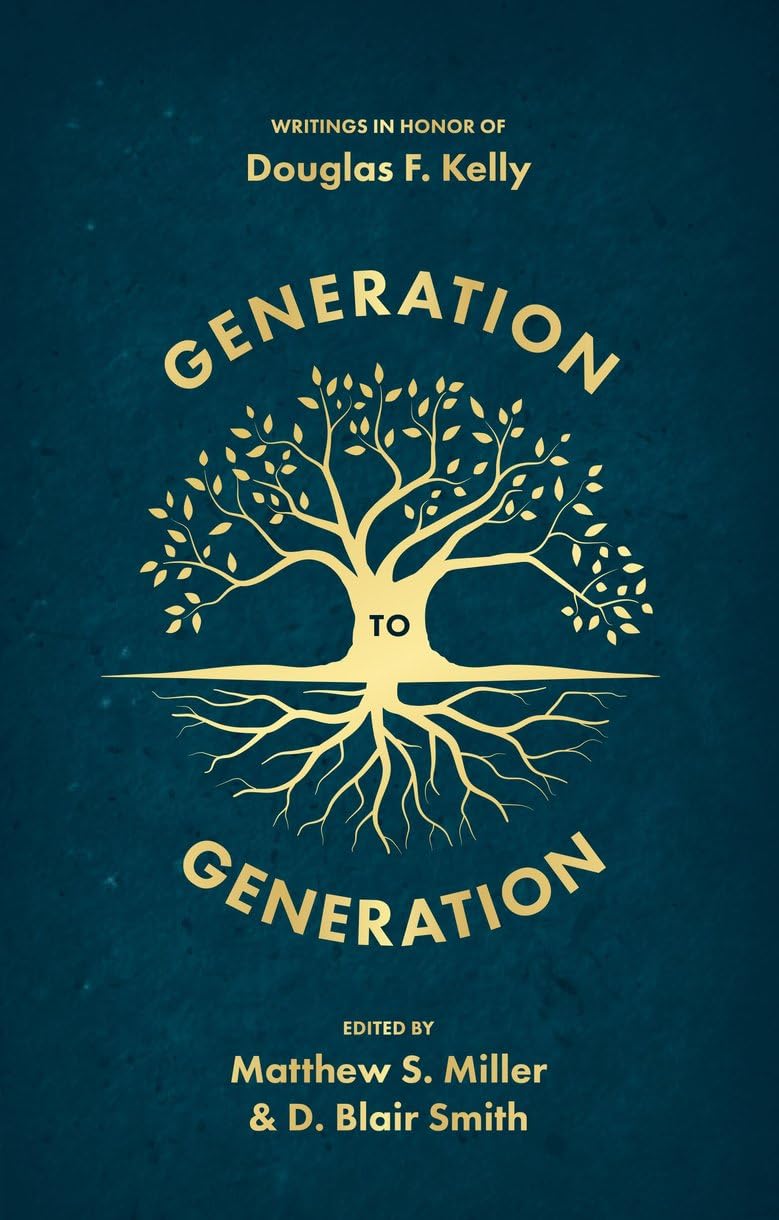The book Generation to Generation: Writings in Honor of Douglas F. Kelly, edited by Matthew S. Miller and D. Blair Smith, is what is known as a Festschrift. A Festschrift is a German word used to denote a volume of collected essays written by different authors in honour of a given scholar. While some have questioned whether such books are really of any value today, one’s reading of Generation to Generation should help one see the tremendous benefit a work like this can have. Far from being a work of a bunch of disjointed parts, mixed with essays of varying quality and scholarship, one can come to this book and find excellent chapters on history, theology, ministry formation and practice, and the Christian life.
These topics reflect the man this book is put together in honour of—Douglas F. Kelly, a Presbyterian pastor and theologian. Kelly has written extensively on a wide range of topics and the subheadings of the book look to match with his interests. Due to the size of the book—which includes 17 chapters plus a preface, introduction, and conclusion—this review will not be able to summarize the book’s entire contents. Instead, I will work through each of the five parts of the book, highlighting some chapters in each section. Overall, my evaluation will be clear—the volume as a whole, and the chapters within it, provide the reader with a wonderful resource.
Following the preface written by the editors is an introductory chapter written by Caroline Kelly, Douglas’ wife. This chapter is on “The Primacy of Family and Scottish Heritage in the Life of Douglas F. Kelly.” Kelly helpfully sets the context of both her and Douglas’ education under Thomas F. Torrance. The introduction, as the title betrays, also speaks about the place of family in Kelly’s life, and offers a call to people to seek family and community in our world today.

Generation to Generation: Writings in Honor of Douglas F. Kelly
Matthew S. Miller and D. Blair Smith
Generation to Generation: Writings in Honor of Douglas F. Kelly
Matthew S. Miller and D. Blair Smith
Part one includes essays on “The Generation of Space and Time.” Two of the essays are biblical studies and the third, by Alex Mark, is on “Rhythms of Rest & Work in the Ministries of Douglas F. Kelly & William Still.” This chapter involves much reflection relevant to the life of those in ministry. It helps one to think seriously about what life should look like—what it means to both rest and work as a pastor. The pastoral life requires a balance. As Mark puts it, “We must know our capacities and callings, and rather than trying to do everything, we must slow down and focus on the main thing: ministering the Word and prayer” (p. 100).
The second part of the book is entitled “Models for the Next Generation of Pastor-Theologians.” This section includes an essay on Athanasius of Alexandria by D. Blair Smith, an essay on George Lawson by Sinclair B. Feguson, and an essay by J. Ligon Duncan, III on Hermann Witsius, William Cunningham, and B.B. Warfield on the role of the seminary in one’s preparation for ministry. In Feguson’s chapter, he helpfully distilled Lawson’s focus in ministry, something for pastor-theologians to consider today as well:
Lawson’s regular focus was fourfold: loving and spiritually nurturing his family; feeding and caring for his Selkirk flock; serving his ministerial brethren in his own and neighbouring presbyteries; and preparing his students for their future ministry at home and abroad (p. 136).
Part three, “The Generations of Calvinism in Geneva and Beyond,” is on history. These essays involve studies on such figures as John Calvin, Theodore Beza, and Bénédict Pictet, and also includes an essay on historical method. These chapters, while certainly of interest to historians, will also be of interest to a wider audience as well. One essay readers may find particularly helpful is that by Kirk M. Summers—“Reconsidering Beza’s Critique of Sebastian Castellio’s Religious Tolerance.” This essay offers helpful historical insight into the infamous story of the execution of Michael Servetus in the sixteenth century. An event often misconstrued or misunderstood, Summers helps one understand the account, dealing with issues of tolerance and intolerance, and how it was perceived by Theodore Beza and Sabastian Castellio.
“Doctrine through the Generations” is the title of part four. These essays deal with theological loci such as Christology, adoption, and union with Christ. Mark Miller’s essay on “The Doctrine of Adoption Revisited: Developments in an Underdeveloped Heritage” helpfully displays how important adoption is to one’s understanding of salvation. It looks at section twelve of the Westminster Confession of Faith “Of Adoption” as well as the contribution made by Kelly on this doctrine.
Part five, “Faithfulness in Our Present Generation,” has three essays that reflect on the life and ministry of Kelly. These chapters give an insight into the person of Kelly and show forth clearly that he is a man one can look to emulate. These essays again offer practical insight into life in ministry, dealing with such issues as how to handle criticism, the importance of reading Scripture and praying, and what the Bible teaches about fasting.
The book closes with a concluding chapter by Matthew S. Miller—“Tribute to Douglas F. Kelly on the Occasion of His Retirement Banquet, April 28, 2016”—along with a bibliography of Kelly’s publications.
This volume presents readers with a depth of writings that are as scholarly as they are spiritually edifying. One reads through this book and receives encouragement, exhortation, and insight into how to live a life for God in service of his people. It is certainly of interest to a wide range of readers, and especially of interest to those who desire to be pastor-theologians in one’s own ministerial context. It is, without question, a book to be highly recommended.




















